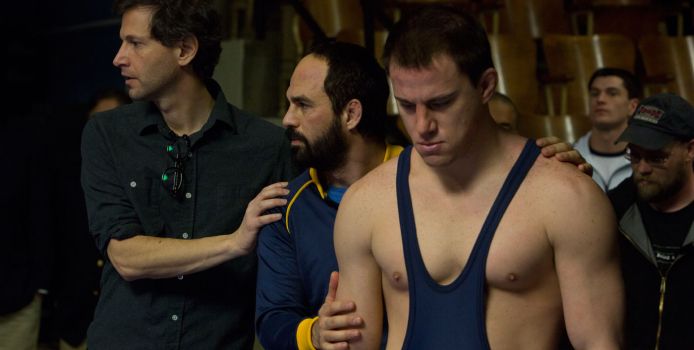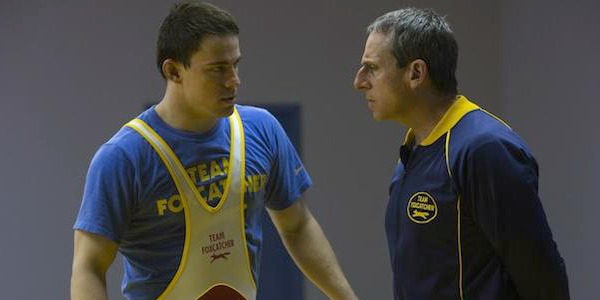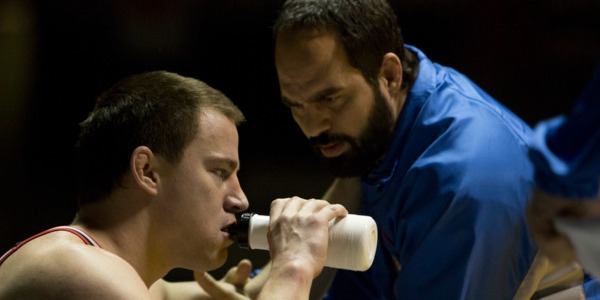FOXCATCHER: A Cold-Hearted Story

Raul Marin is a contributor for Film Inquiry. He is…
The discussion on the best knockout films of all-time continues. If you missed my review on Million Dollar Baby in December, it served as the start of this discussion. This includes films based on boxing, wrestling, martial arts, MMA, etc. As award season is about to start, it’s a good idea to see where this Oscar-hopeful for best picture falls on that list.
This is Bennett Miller‘s third full-feature film, and all of them are based on true stories. He previously directed Moneyball and Capote. While Moneyball and Foxcatcher have a sports theme in common, they couldn’t be further apart in terms of the stories they present.
What I was hoping to see in this movie, and what I eventually saw are very different. Staying away from spoilers and reviews, I was anticipating some quality wrestling scenes. I was hoping that they would take up significant screen time. Even though that wasn’t the case, the film makes some strong commentary on things that are worth discussing here: dysfunctional relationships, the abuse of power and money, and the downside to the drive for success.
Dysfunctional Relationships
Foxcatcher is based on the true story of Olympic gold and World Championship winners Mark (Channing Tatum) and David (Mark Ruffalo) Schultz. As the 1988 Olympic Games in Seoul are quickly approaching, Mark receives an unexpected invitation from eccentric multi-millionaire John E. du Pont (Steve Carrell) to train at Foxcatcher Farms as part of the U.S. national wrestling team. For most of his life, Mark has been second best compared to his highly-respected brother Dave. So, this is an opportunity for Mark to be the best in the world at Seoul. The relationships that would develop from this triangle of characters will ultimately be untimely and devastating for all.
While Mark may be initially driven to succeed at Foxcatcher because of his sibling rivalry with Dave, he is also stuck in a dysfunctional relationship with society. His life is consumed by what he can achieve with wrestling because outside of the sport, he doesn’t have a life that he can enjoy. Mark has no job, friends, or a romantic partner in his life, and the only family he has is Dave, who has been like a father-figure for him. Then there’s John E. du Pont, who takes the opportunity of coaching to be like a father and mentor for Mark. During the 134-minute runtime of the movie, long and continuous shots are taken of Mark and his surroundings. He doesn’t say much, but the shots capture the emotional burden of how all of these dysfunctional relationships weigh on his mind.

Perhaps the most intriguing dysfunctional relationship in this film, however, is between du Pont and his mother (Vanessa Redgrave). While her character may not contribute a great deal to the dialogue, she plays a very pivotal role in the movie. There’s a lot to be said about how much John and Mark value the opinions of what others have of them because it seems like it’s not enough to simply do well at the Olympics. No matter what John does as a wrestling coach, his mother disapproves. No matter how hard Mark fights, there seems to be more respect and admiration for his brother. The tension in these dysfunctional relationships is palpable throughout the film, and interestingly, it’s what makes John and Mark similar to each other: they both seek approval and recognition for what they do.
Abuse of Power And Money
John E. du Pont is a very difficult character to watch on screen. He’s a lot darker than the comedic characters that we’ve seen Carrell do throughout his career. It has been said in many movies that with great power comes great responsibility. For John, he demonstrates that responsibility by writing checks; whatever the cost may be. He strongly conveys the notion that money is power. He has no knowledge of coaching, nor the fundamentals of wrestling to be an effective coach for the team either. This is evidenced by a scene in the movie where he actually pays for a victory in a wrestling match that he fought.
du Pont is a man that can’t be negotiated or bargained with. In fact, the biggest mistake that can be made is to deny his requests. Perhaps his character is symbolic of the rich and wealthy in society. There’s nothing they can’t seem to do because of the money they possess; whereas the working and middle-class people must work and fight for everything they have. For someone like du Pont, who has that kind of money, wrestling under his coaching at Foxcatcher seemed like an amazing experience. However, it was Mark who found out firsthand that du Pont can grow bored with you just as quickly as increasing your pay at his convenience. In other words, John wasn’t interested in helping the wrestlers to overcome challenges or adversity in their matches, or much less, work as a team to succeed. John does what he wants and when he wants because of the power that he possesses over the team, but more specifically, over Mark and Dave.
The Cons To Driving For Success
The downside to driving for success is failure. This is where thoughts of what I could have, should have, or would have done come into question. Maybe this was a directing decision, but we don’t get to see Mark celebrate his accomplishments. Throughout the movie you will notice that there is a silent and somber tone to it. Instead of watching Mark’s confidence improve from match to match for instance, we’re exposed to watching him struggle physically and emotionally during his training at Foxcatcher. He had everything to fight for, so he’s a character that you empathize with throughout the film.

Ultimately, everything that du Pont wanted to accomplish with the wrestling team at Foxcatcher, and what that represented for the country, turned out to be a failure as well. His controlling nature and eccentric behavior on and off the mansion made him unworthy of being a mentor. More importantly for him, regardless of what Mark, Dave, and the wrestling team could have achieved, none of it would matter if John didn’t have the approval of his mother. He may have been too prideful to say it, but it choked him inside not to have it. John’s a character that fed on the desire of people like Mark who needed something or someone, but he did it to satisfy his needs.
Foxcatcher is a drama that touches on the problem with money in the United States, and the improper funding of things, and care of people. You could argue that it makes an upside down look at the American Dream. There’s also a message to take about dysfunctional relationships: if they’re not addressed, they can have serious problems for a person moving forward. What lies deep inside at the core of this film is a dark and cold-hearted story.
This story was brought to life by the captivating performances by Steve Carrell and Mark Ruffalo. Both of them have already earned many award nominations for their performances. You will also see a career-best performance from Channing Tatum. As for Bennett Miller, the silence in the movie, the long shots, and careful dialogue all add to the drama that unfolds from the beginning.
Now it’s time for your thoughts. Should Steve Carrell be cast to do more serious roles? What kind of film should Bennett Miller direct next that is not based on a true story?
Does content like this matter to you?
Become a Member and support film journalism. Unlock access to all of Film Inquiry`s great articles. Join a community of like-minded readers who are passionate about cinema - get access to our private members Network, give back to independent filmmakers, and more.
Raul Marin is a contributor for Film Inquiry. He is a teacher by day and a DJ by night, but he's a film fan 24/7! His favorite genre is drama.













